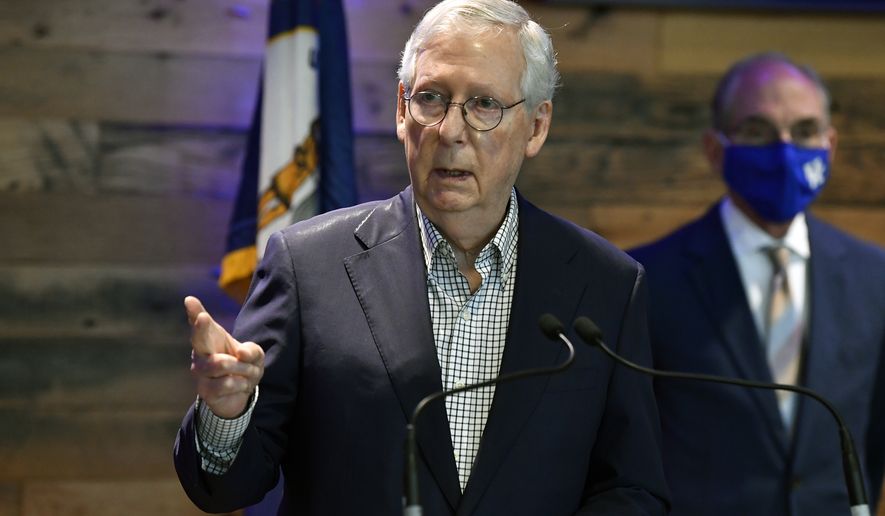Senate Minority Leader Mitch McConnell accused corporate America of pushing “disinformation” about Georgia’s new voter integrity law in order to create momentum for the Democratic Party’s massive federal election overhaul.
Addressing the recent backlash over Georgia’s voting legislation, the Kentucky Republican argued that the private sector had surrendered to a left-wing “outrage industrial complex.”
“We are witnessing a coordinated campaign by powerful and wealthy people to mislead and bully the American people,” the minority leader said Monday.
“Wealthy corporations have no problem operating in New York, for example, which has fewer days of early voting than Georgia, requires excuses for absentee ballots and restricts electioneering via refreshments,” Mr. McConnell said. “There is no consistent or factual standard being applied here.”
The minority leader said a “fake narrative [was] gaining speed” just as Democrats prepared to return to Capitol Hill next week and push their signature elections overhaul.
Titled the For the People Act, the bill would radically change the way Americans vote. It grants statehood to the District of Columbia and institutes automatic voter registration, including for felons, and requires nationwide vote-by-mail. The bill also expands federal review for state election laws.
“This power grab is impossible to defend, so the left wants to deflect,” Mr. McConnell said. “Instead of winning the debate, they want to silence debate by bullying citizens and entire states into submission.”
The “bullying” is evident in Georgia, said the minority leader, where Major League Baseball and other corporate giants have instituted an economic boycott.
The organizations claim they are pulling out of the state because of its newly enacted elections law, which some have characterized as voter suppression.
Georgia Republicans, however, argue that their effort to streamline and modernize election laws is the result of local governments devising makeshift voting guidelines during the pandemic.
The impromptu decision-making, a necessity of the coronavirus crisis, created confusion during the 2020 presidential contest. In some cases, voting rules drastically differed between neighboring cities and counties. The relaxed attitude even allowed local officials to set their own timelines for counting votes. As a result, Georgia was not called for Joseph R. Biden until nearly two weeks after Election Day.
“There’s no doubt there were many alarming issues with how the election was handled, and those problems, understandably, led to a crisis of confidence in the ballot box here in Georgia,” Gov. Brian Kemp, a Republican, has said.
The legislation crafted by Mr. Kemp and Georgia’s Republican-led General Assembly seeks to restore the integrity of the ballot box while balancing access with participatory democracy.
As such, the bill streamlined the requirements for regular and absentee voting. Voters seeking absentee ballots are now required to provide proof of identification, much like people going to the polls on Election Day. Previously, voters had to ensure only that the signature on their absentee ballot matched the signature on file with local elections officials.
Contrary to some claims, the bill does not require an excuse to obtain an absentee ballot, unlike states such as Delaware and Virginia.
Georgia’s law also expands early voting to weekends, ensuring that residents will have a maximum of 19 days before a primary or general election to cast ballots.
It further expands the use of ballot drop-off boxes. The bill mandates that each of the state’s 159 counties have a minimum of a number of drop-off boxes for mail-in ballots. Before 2020, the state did not use ballot drop-off boxes and required voters to deliver absentee ballots to local election offices.
The bill’s most embattled provision, however, deals with prohibiting political organizations from handing out food and water within 150 feet of a polling location or 25 feet of a voter.
In the November election, political groups were soliciting voters to their cause outside polling locations with items inscribed with a particular candidate’s message, symbol or likeness. The new law makes such political advertising at the polls a misdemeanor offense.
Despite a number of the provisions being broadly popular with voters, especially the voter ID requirements, Democrats have alleged that the overall legislation is a throwback to the era of racial segregation. In response to such claims, major corporations have decided to pull their investments out of Georgia.
The most high-profile organization to date that has done so is the MLB, which last week announced its annual All-Star Game and draft would not be held in Atlanta as planned.
“Major League Baseball fundamentally supports voting rights for all Americans and opposes restrictions to the ballot box,” said Rob Manfred, the league’s commissioner.
Mr. McConnell, though, does not believe the MLB and other private-sector entities are operating in good faith.
“Americans do not need or want big business to amplify disinformation or react to every manufactured controversy with frantic left-wing signaling,” the minority leader said. “Businesses must not use economic blackmail to spread disinformation and push bad ideas that citizens reject at the ballot box.”
Mr. McConnell is pushing back against the boycott as Republicans at all levels of government mobilize to defend the Georgia law.
The impact of the pushback seems to be working. On Monday, the Biden administration tried to distance itself from the boycott, even after harshly criticizing the Georgia law last week.
White House press secretary Jen Psaki told reporters that President Biden’s comments last week saying he would “strongly support” MLB moving the All-Star Game were wrongly viewed as a call for action.
“He was not dictating for what Major League Baseball should do — dictating that they should move the All-Star Game,” Ms. Psaki said. “That was their decision. They made that decision, and … he certainly supports that.”
• Haris Alic can be reached at halic@washingtontimes.com.




Please read our comment policy before commenting.